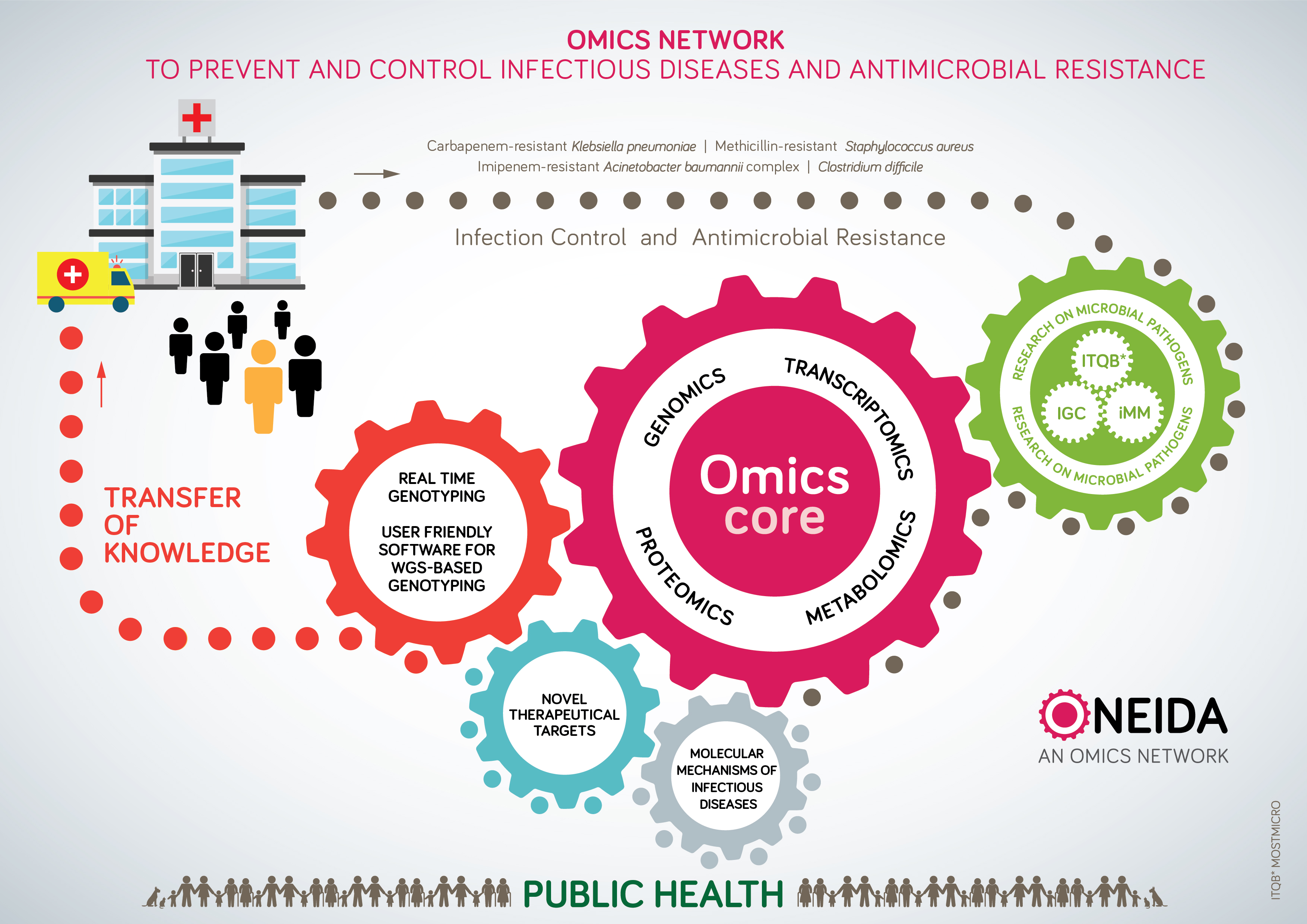2,5 million euros to prevent and control bacterial infections
Oeiras, 2.09.2016
A consortium established between Instituto de Tecnologia Química e Biológica António Xavier (ITQB NOVA), Instituto de Medicina Molecular (iMM) and Instituto Gulbenkian de Ciência (IGC) was awarded with 2.5 million euros to match the urgent need for effective solutions in the prevention and control of infectious diseases and antibiotic resistance.
The project ONEIDA will benefit from the longstanding experience, track-record and competences in research on bacterial infections of the three Portuguese Research Units, ITQB NOVA, IMM and IGC, for the benefit of Public Health.
For the next 3 years, more than 80 researchers will be committed in providing real time answers to specific needs of Lisbon hospitals in matters concerning infectious diseases. This will in turn provide valuable data for research advancement in the field. ONEIDA also wants to ensure that the knowledge created by this consortium will reach all the interested stakeholders in this matter (health care institutions, policy makers, the scientific community and the general public), while training a new generation of young researchers in the field.

Coordinated by Raquel Sá-Leão and Mónica Serrano from ITQB NOVA’s unit MostMicro, ONEIDA will establish a unique core of researchers and institutions that will receive samples and information from the clinic, and then carry out genetic and protein profiling of microbial pathogens. The information gathered will allow a more informed and efficient control of infections, while supporting the scientific community working on human and animal pathogens with important data.
ONEIDA was funded by Portugal 2020, a programme that is based on 5 European Structural Funds - FEDER, Fundo de Coesão, FSE, FEADER e FEAMP – aiming to align the National and European strategies for the economic, social and territorial development planned for Portugal until 2020.
About the partners
The Instituto de Tecnologia Química e Biológica António Xavier (ITQB NOVA) is an academic research centre of the Universidade Nova de Lisboa. Its mission is to carry out scientific research and postgraduate teaching in chemistry, life sciences, and associated technologies, for the benefit of human health and the environment. Currently with 58 independent teams, ITQB NOVA hosts more than 460 researchers with different backgrounds and research interests.
Established by the Calouste Gulbenkian Foundation, the Instituto Gulbenkian de Ciência (IGC) is an international research center devoted to biological research and to graduate training. Around 400 people work at the IGC, implementing a multidisciplinary scientific programme in an environment designed to encourage interactions and exploit synergies. The IGC also runs PhD programmes explicitly directed towards intellectual breadth and independent scientific thought, and has a dedicated outreach and public engagement in science programme. More information at www.igc.gulbenkian.pt
The iMM Lisboa – Instituto de Medicina Molecular is a leading Portuguese private non-profit research institute that offers a vibrant scientific environment, aiming to nurture innovative ideias in basic, clinical and translational biomedical research.
On Social Media
Facebook, Twitter and Linkedin
In the news
-
80 investigadores portugueses juntos contra infeções e resistência a antibióticos nos hospitais, RTP online, 2.09.2016
-
80 investigadores portugueses juntos contra infeções e resistência a antibióticos nos hospitais, Observador, 2.09.2016
- Investigadores portugueses juntos contra infecções e resistência a antibióticos nos hospitais, Público, 2.09.2016
- 80 investigadores portugueses juntos contra infeções e resistência a antibióticos nos hospitais, Correio da Manhã, 2.09.2016
- 80 investigadores juntos contra infeções e resistência a antibióticos, Notícias ao Minuto, 2.09.2016
-
80 investigadores portugueses juntos contra infeções e resistência a antibióticos nos hospitais, Diário Digital, 2.09.2016
-
80 investigadores portugueses juntos contra infeções e resistência a antibióticos nos hospitais, Porto Canal, 2.09.2016
-
80 investigadores portugueses juntos contra infeções e resistência a antibióticos nos hospitais, Net Farma, 2.09.2016
-
2,5 milhões de euros para a prevenção e controlo de infecções hospitalares, Barlavento, 2.09.2016
-
2,5 milhões de euros para a prevenção e controlo de infecções hospitalares, Elvas News, 2.09.2016
-
Investigadores portugueses contra infecções hospitalares, Diário das Beiras, 3.09.2016
-
2,5 milhões de euros para a prevenção e controlo de infecções hospitalares, Penacova Actual, 5.09.2016
-
Portuguese researchers granted €2.5m to work on antibiotic resistance, Portugal News, 8.09.2016
-
2,5 milhões de euros para a prevenção e controlo de infecções hospitalares, Jornal Aurinegra (online), 12.09.2016
-
Perigo: As super bactérias fugiram dos hospitais, Visão (papel), 29.09.2016
-
2,5 milhões de euros para a prevenção e controlo de infeções hospitalares, Jornal de Monchique, 30.09.2016
-
2,5 milhões de euros para a prevenção e controlo de infecções hospitalares, Jornal Aurinegra (papel), 30.09.2016
-
Fundos Europeus para Investigação, Revista de Outubro da Fundação Calouste Gulbenkian, 1.10.2016







